- News
- Reviews
- Bikes
- Accessories
- Accessories - misc
- Computer mounts
- Bags
- Bar ends
- Bike bags & cases
- Bottle cages
- Bottles
- Cameras
- Car racks
- Child seats
- Computers
- Glasses
- GPS units
- Helmets
- Lights - front
- Lights - rear
- Lights - sets
- Locks
- Mirrors
- Mudguards
- Racks
- Pumps & CO2 inflators
- Puncture kits
- Reflectives
- Smart watches
- Stands and racks
- Trailers
- Clothing
- Components
- Bar tape & grips
- Bottom brackets
- Brake & gear cables
- Brake & STI levers
- Brake pads & spares
- Brakes
- Cassettes & freewheels
- Chains
- Chainsets & chainrings
- Derailleurs - front
- Derailleurs - rear
- Forks
- Gear levers & shifters
- Groupsets
- Handlebars & extensions
- Headsets
- Hubs
- Inner tubes
- Pedals
- Quick releases & skewers
- Saddles
- Seatposts
- Stems
- Wheels
- Tyres
- Health, fitness and nutrition
- Tools and workshop
- Miscellaneous
- Buyers Guides
- Features
- Forum
- Recommends
- Podcast
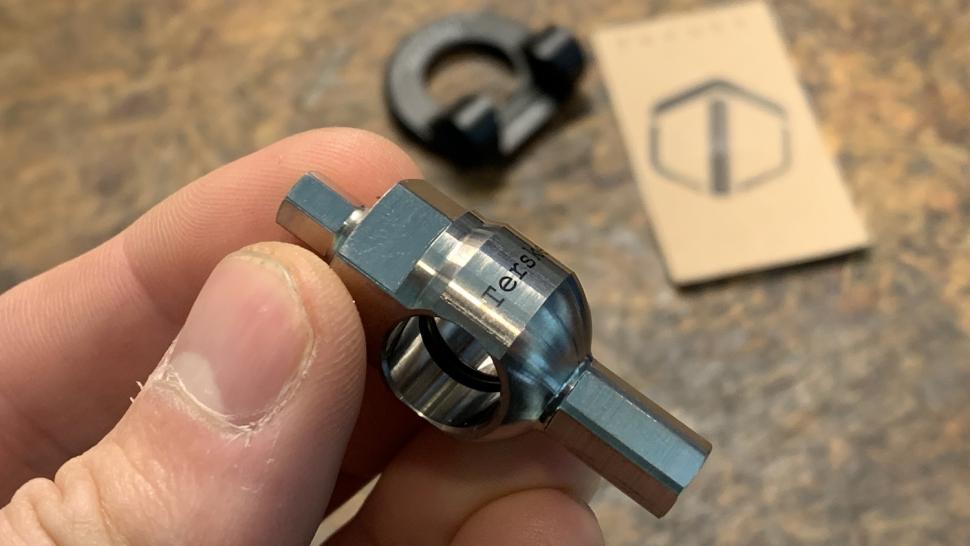 Lindarets Terske Travel 6:8:16mm Hex Tool For Cinch Cranksets.jpg
Lindarets Terske Travel 6:8:16mm Hex Tool For Cinch Cranksets.jpg£24.95
VERDICT:
Clever and easily-stashed way of carrying a 16mm hex key almost unnoticably – so long as you have 12mm axles
Compact
Beautifully made
Requires 12mm axles to work
Risks damaging your axle
Weight:
37g
Contact:
At road.cc every product is thoroughly tested for as long as it takes to get a proper insight into how well it works. Our reviewers are experienced cyclists that we trust to be objective. While we strive to ensure that opinions expressed are backed up by facts, reviews are by their nature an informed opinion, not a definitive verdict. We don't intentionally try to break anything (except locks) but we do try to look for weak points in any design. The overall score is not just an average of the other scores: it reflects both a product's function and value – with value determined by how a product compares with items of similar spec, quality, and price.
What the road.cc scores meanGood scores are more common than bad, because fortunately good products are more common than bad.
- Exceptional
- Excellent
- Very Good
- Good
- Quite good
- Average
- Not so good
- Poor
- Bad
- Appalling
The Lindarets Terske Travel 6/8/16mm Hex Tool For Cinch Cranksets is a clever way to get heavy torque onto large hex fasteners without being being huge – it uses your 12mm through-axle as its handle. It's an artisan-grade chunk of design for remote-trail fettling, though not cheap given its niche useage. Also, if you get too enthusiastic you could end up fixing your crank but bending your axle...
Every now and then a genuinely innovative tool comes along that makes you slap your forehead and ask, 'why didn't I think of that?'. This thing wins that prize, as well as the one for Possibly The Longest Tool Name In Cycling, by using an existing part of your bike as its lever to save both space and weight.
Lindarets is a US design firm, and often partners with bigger brands like Wolf Tooth - if you ride a Goat Link, for instance, that's a Lindarets design. As with all Lindarets stuff the quality is top-notch. This is beautifully machined from stainless steel, and finished with laser-etched graphics.
Most multitools have 6mm and 8mm hex bolts covered, but the challenge comes when you need to apply serious welly – short tool bodies or soft metals can fail you – or need something larger still. If you have a crankset that takes a 16mm hex (such as the non-drive side bolt and self-extraction caps on RaceFace and Easton Cinch cranks) your ride is over.
Now that's a pretty niche use case, and I'd imagine the Venn diagram of people who ride such cranks and have middle-of-nowhere issues is pretty darn small. But it's clearly not so small it doesn't exist.
For the vast majority of cyclists the interesting bits here are the 6 and 8mm hexes for pedals or cranks, and possibly saddle rail clamps / through axles themselves, and the opportunity to get borderline medieval levels of torque. Being so compact it will disappear into the smallest space in a framebag or seatpack, ready to save the day when needed.
> 11 of the best cycling multi tools — get the right bits to fix your bike's bits
But there's then the concern that you might be left with a tight fastener but a bent axle. Lindarets recommends checking the thickness of your axle walls is at least 3mm, and only using your hands – you shouldn't use a foot and really crank on it, for instance. Relatively high torques are safely do-able without risk to your axle; I tested this on fasteners done up to 40Nm, loosening and tightening them without issue.
One drawback is that you obviously can't install both your own axles with it, as you need one to tighten the other.
Value
This is a clever and easy-to-pack tool that could, in very limited circumstances, save the day. The only things it really offers over a decent multi-tool, however, are a 16mm hex key and some easy leverage. You can get the first and most of the second for less cash with a regular hex key such as this £12 one from Facom, though at 370g and 154mm long, it'll hardly go unnoticed.
Alternatively, the Race Face Hex Adaptor Tool slots onto an 8mm key to make it 16mm, is very small and light and costs £6.95.
Overall
If you're planning a huge tour, an overseas trip or just don't like going unprepared for anything and everything – and you ride 12mm through-axles – this could be a ride-saver.
Verdict
Clever and easily-stashed way of carrying a 16mm hex key almost unnoticeably – so long as you have 12mm axles
If you're thinking of buying this product using a cashback deal why not use the road.cc Top Cashback page and get some top cashback while helping to support your favourite independent cycling website
road.cc test report
Make and model: Lindarets Terske Travel 6/8/16mm Hex Tool For Cinch Cranksets
Size tested: 6/8/16mm
Tell us what the product is for and who it's aimed at. What do the manufacturers say about it? How does that compare to your own feelings about it?
Lindarets says: "Every once in a while we find ourselves on the trail or away from home needing a tool that's really, really hard to fake. Say, for example, the 16mm hex key needed for the non-drive side fixing bolt and self-extraction caps on RaceFace and Easton Cinch cranks. And that's precisely what this is for.
"It works with a 12mm thru-axle (not included) and fixes a problem that doesn't come about often but can ruin your day if it does.
"We added deep 6mm and 8mm hexes to the tool to easily tighten external-bearing cranks. Those are common pedal hex sizes too, which makes reassembling a bike in a foreign hotel that much easier than with a pocket-sized tool (pedals should be tightened to 36-40Nm)."
Tell us some more about the technical aspects of the product?
SPECIFICATIONS
Precision machined from SAE 420 stainless steel
Reassuringly dense and 36g light
For use with 12mm thru-axles with a 3mm minimum wall thickness
IMPORTANT NOTES
40Nm max torque.
How much is that? It's as if you were hanging 25lb of stuff from the handle, 110mm from the centre of the tool (roughly the middle of your hand at the end of a rear thru-axle). Any more and you're going to want a beefier handle.
Some fittings, especially 16mm self-extracting lockrings, are awfully shallow. Take care to ensure full engagement and avoid stripping.
Use only with 12mm thru-axles with a 3mm (1/8in) or thicker wall (6mm max thru hole).
Common sense is your friend: super-light parts don't like to be used as handles, but those with a 3mm wall (3-3.5mm is common) will give you a good margin of safety when the maximum torque value is observed.
This is a hand tool: Don't use a cheater bar, hammer, foot, rock or anything else that isn't your hand to apply force.
If you overdo it and bend your axle, don't put it back in your bike! One, it could get stuck. Two, it could be weakened and fail somewhere down the road. You don't want that and we don't either.
Wear eye protection. Seriously. You only get two and they're awfully hard to fix. You should have specs on while riding anyway.
Rate the product for quality of construction:
10/10
Faultless.
Rate the product for performance:
9/10
Rate the product for durability:
10/10
Bombproof.
Rate the product for weight (if applicable)
7/10
Rate the product for value:
5/10
Tell us how the product performed overall when used for its designed purpose
Precise, solid and bombproof – so long as your 12mm axle is tough enough.
Tell us what you particularly liked about the product
The design. Genius.
Tell us what you particularly disliked about the product
The price is quite high.
How does the price compare to that of similar products in the market, including ones recently tested on road.cc?
It's more than twice the price of a regular 16mm hex key, though around 10 times lighter and considerably smaller too. However, the official Race Face adaptor (8mm to 16mm) is smaller even than the Lindarets and under £7, which makes this look expensive.
Did you enjoy using the product? Yes
Would you consider buying the product? Yes
Would you recommend the product to a friend? Yes
Use this box to explain your overall score
This is beautifully engineered and perfectly designed, so the price feels fair in that sense – it's a lot to spend on a very niche tool, though, and you need the right bike spec to make it useful. Overall though, it's still very good.
About the tester
Age: 47
I usually ride: Sonder Camino Gravelaxe My best bike is: Nah bro that's it
I've been riding for: Over 20 years I ride: A few times a week I would class myself as: Expert
I regularly do the following types of riding: cyclo cross, general fitness riding, mtb, G-R-A-V-E-L
Living in the Highlands, Mike is constantly finding innovative and usually cold/wet ways to accelerate the degradation of cycling kit. At his happiest in a warm workshop holding an anodised tool of high repute, Mike's been taking bikes apart and (mostly) putting them back together for forty years. With a day job in global IT (he's not completely sure what that means either) and having run a boutique cycle service business on the side for a decade, bikes are his escape into the practical and life-changing for his customers.
Latest Comments
- Bungle_52 3 min 27 sec ago
I have some sympathy. You have to pay out for excise duty and MOT irrespective of how often you use a vehicle so it probably makes economic sense...
- OldRidgeback 26 min 48 sec ago
Interesting, tho they only take narrow 20" slick tyres. I'd want to be able to use 1.75 Maxxis DTHs.
- don simon fbpe 54 min 48 sec ago
Who'd've thought that a certain whinging section (right whingers get uppity for calling them what they are) of society would resort to division,...
- Exup 2 hours 27 min ago
At least some justice is being done........
- BIRMINGHAMisaDUMP 2 hours 37 min ago
I imagine the Police treat bike theft as an insurance issue rather than a criminal issue. Can't blame them to be honest. The best thing is to use...
- David9694 3 hours 3 min ago
Police launch investigation into destruction of barber shop in Hythe High Street...
- ktache 11 hours 33 min ago
I'd love for them to put a number on that "inappropriate speed"
- Nick T 12 hours 26 min ago
They need to use some harder material for the cleat retention clip really, that's worn out long before any bearing has had a chance to fail on...
- yiipeeia 15 hours 16 min ago
I am 67 and I cycle with two groups during the year The Haddenham Easyriders International who ride during the summer on Thursday evenings, and The...



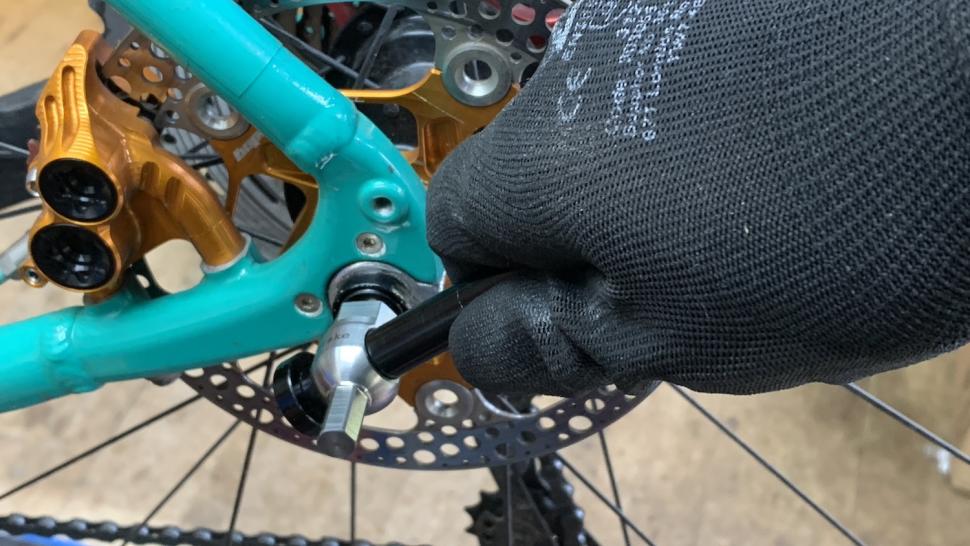
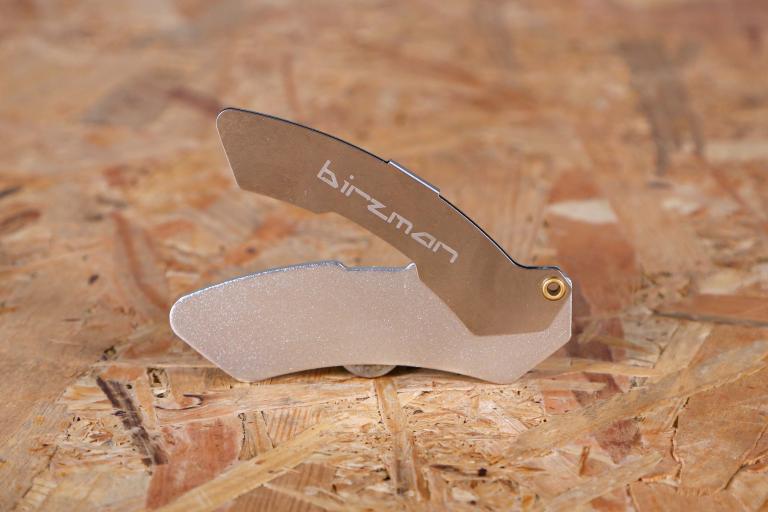
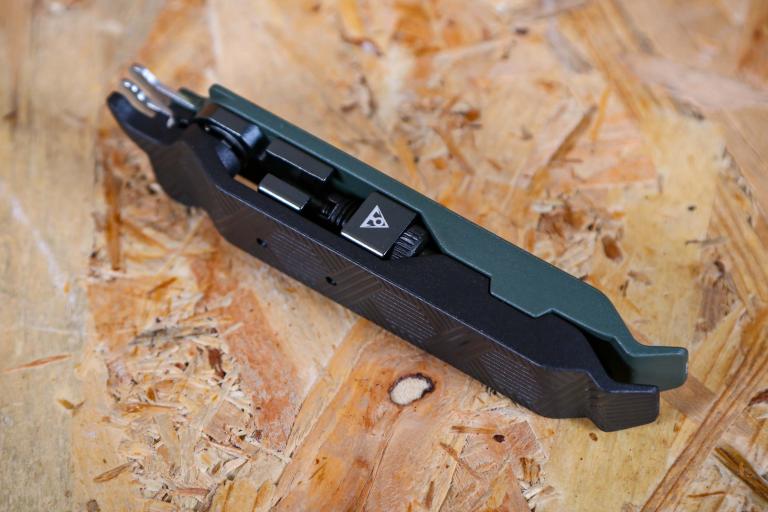
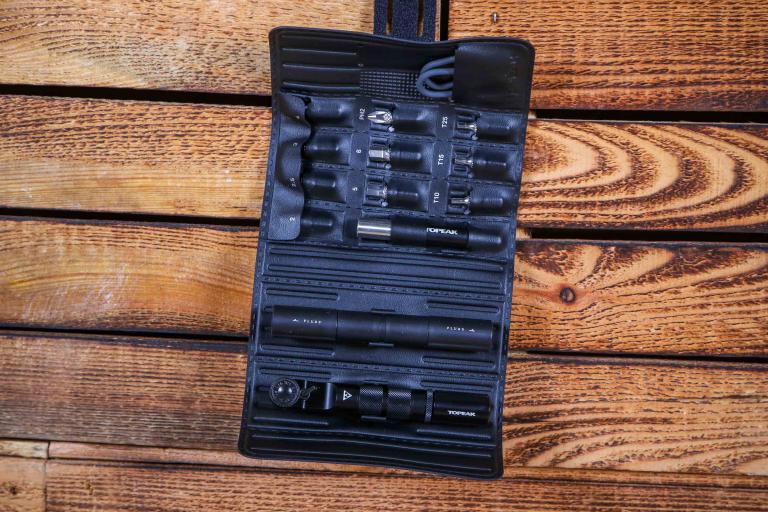
Add new comment
7 comments
As I see it this tool is useless for thru axles as you need to undo one of them in order to be able to use it. As for the 16mm crank fitting (I've never come across one) I can't imagine being able to up a crank to a suitable torque without bending the thru axle, which you needed a different tool to remove in the first place. Am I missing something here? I do hope so.
As for the "Longest Tool Name" I think that would be Hugh Jampton.
Just wondering if you, y'know, read the review? Because every point you raise is covered in there.
So why does it get an 8/10 rating?
Because it's really good at what it does, in the particular use case it was designed to work for.
If I used a Cinch crankset / needed to heavy 6/8mm hexes, and did a lot of remote riding, *and* had a 12mm axle, this would be high on my list to get.
It's OK that you don't see that use case as a priority. Cycling is a very, very broad church.
Well that's a lot of ifs and the 6mm hex head is redundant as you need to carry a 6mm allen key in order to undo your thru axle in order to use the tool. I can certainly appreciate that for riding out in the sticks with a Race Face Cinch crankset you might want to have the reassurance of being able to tighten up a loose crank (although in over 40 years of cycling I've never had a crank come loose on me and have never carried a 14mm socket and the wherewithal to use it) so it strikes me that the only advantage that this tool has over a Cinch adapter is that you only need to carry one allen key rather than two, and a marginal weight saving of not having to carry an 8mm allen key, although that would be partially offset by the adapter being a bit lighter than this tool. On the other hand using a Cinch adapter there's no risk of bending your thru axle and there would be no danger in putting all your weight on an 8mm allen key if needed. As you say cycling is a very broad church and I'm not criticising your choices, I'm just not sure that with such a limited advantage over an adapter and an 8mm allen that this tool has much going for it. It has ocurred to me that you could save a bit more weigh by cutting off the 6mm hex wrench as it is redundant.
I think you'll find most cycling products need a number of 'ifs' applied to find the sweet spot for *any* consumer.
The torque required to undo any through axle is way less than that required to do up a crankarm. On my Sonder Camino, it's 10Nm max - easily delivered by any multitool. The Cinch crankset requires 40Nm - way beyond what's comfortably or even physically-possible with a small multitool. That's even assuming you have a 8-16mm converter.
Many bikes now feature a QR skewer or removable tool on the rear through-axle, so you don't even need a tool to liberate the axle for use with a tool like the Lindarets.
If you've never had a crank come loose in 'over 40 years of cycling', good for you! You're fortunate, especially having lived through the heady days of cheap alloy square-taper cranks. As a mechanic serving customers today, I can assure you loose cranks are indeed still A Thing That Happens. I had to tighten one yesterday.
If used properly, this tool will tighten a crank bolt or pedal to 40Nm without risking damage to the through axle. It's in the review and Lindaret's literature.
The 6mm hex is not redundant, as many pedals requiring 40Nm torque use 6mm hexes. Shimano believe 6mm Hexes are not capable of that torue, other hex key manufacturers disagree.
not nearly as many letters as Alexander Boris de Pfeffel Johnson